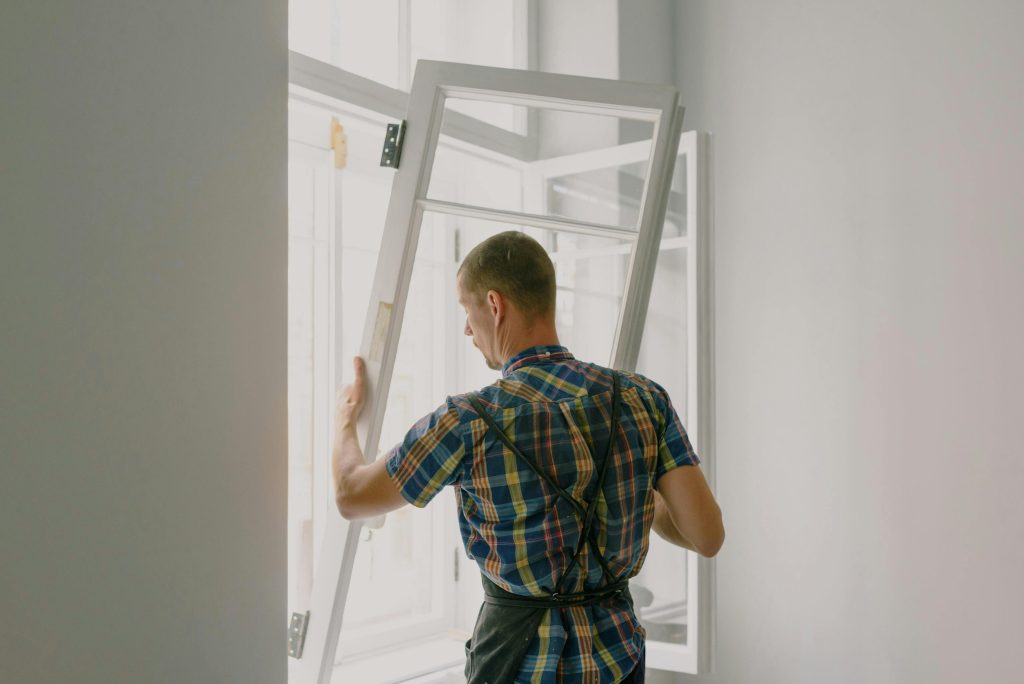There are several window glass types available today—some are great for soundproofing, and some not. If you are a homeowner with noise pollution problems, replacing your existing window with soundproof window glass would significantly help.
The question is: what window glass types are best for soundproofing?
In this guide, our experts here in Buckeye Glass Repair will walk you through the difference between regular window glass types and soundproof glass, best options available, and how they help block out unwanted noise.
Let’s start.
What Is a Soundproof Window Glass?

Soundproof windows are designed to reduce noise transmission through the use of layered construction and specialized acoustic materials. These materials work to absorb, reflect, and dampen sound waves, significantly outperforming standard window glass in noise reduction.
How Does Soundproof Window Glass Work?
Soundproofing works by disrupting sound waves as they try to pass through the glass. The effectiveness of soundproof window glass depends on:
- Glass Thickness. The thicker the glass, the more it absorbs and deflects sound.
- Multiple Layers (Double or Triple Panes). Since thickness significantly affects the noise reduction capability of window glasses, extra layers create more barriers for sound waves, which in return reduces noise penetration.
- Laminated Glass with Interlayers. Some soundproof window glass types come with a special sound-dampening plastic interlayer such as polyvinyl butyral or PVB. It is placed between glass sheets to absorb vibrations and block noise.
- Air Gaps or Gas Filling. In double or triple-pane windows, the space between glass panes can be filled with air or inert gases (like argon or krypton) to enhance sound insulation.
- Frame and Sealing Quality. Excellent workmanship matters. Quality window frames and tight sealing help prevent sound leaks around the edges.
How Is Soundproof Glass Different from Regular Glass?
Soundproof window glass types have different composition than regular ones. Thus, they work differently.
Here’s how:
| Feature | Soundproof Window Glass | Regular Window Glass |
| Noise Reduction | Blocks significant noise like neighbors, construction, etc | Minimal noise reduction |
| Glass Type | Laminated, acoustic, multi-pane | Single-pane or standard double pane |
| Layers | Multiple layers with sound-dampening interlayers | Typically single or double-pane glass |
| Air or Gas Filling | Uses air gaps or inert gases for insulation | Standard air-filled space |
| Vibrations Absorptions | Dampen soundwaves with interlayers | Does not effectively reduce sound vibrations |
| Cost | Higher investment for better soundproofing | More affordable but less effective |
Four Window Glass Types that are Great for Soundproofing
There are four window glass types known for their excellent soundproofing capabilities. These are laminated glass, double-pane glass, triple-pane glass, and acoustic glass.
Laminated Glass
Laminated glass is one of the most effective options for a soundproof window. It is composed of two or more glass panes with a special plastic interlayer—usually polyvinyl butyral or PVB—sandwiched between them.
The interlayer acts as a sound-dampening barrier, and reduces the amount of noise that can pass through. It is ideal for homes living near busy streets, airports, or commercial areas where noise pollution is a constant concern.
Its key characteristics include::
- Blocks a significant amount of external noise
- Reduces vibrations that allow sound to pass through
- Adds an extra layer of security (since it’s shatter-resistant)
- Provides UV protection, reducing sun damage to interiors
Double-Pane Glass
Double-pane glass has two layers with air or gas in between. This helps block more sound than regular single-layer glass. Although keep in mind that while this glass type offers decent noise reduction, they are not as effective as laminated glass when it comes to blocking loud, low-frequency noises like traffic or construction sounds.
Its key characteristics include:
- Lessens external noise by up to 50% compared to single-pane windows
- Provides insulation for improved energy efficiency
- More affordable than laminated or triple-pane glass
Triple-Pane Glass
Triple-pane glass, with its extra layer of glass, takes noise reduction to the next level. These windows consist of three glass panels separated by air or gas-filled spaces that create multiple barriers against sound transmission.
It is ideal for homes and commercial spaces located in urban areas, particularly if with heavy traffic.They can be more expensive and heavier than other options, however, requiring sturdier window frames.
Its key characteristics include:
- Blocks out even more noise than double-pane glass
- Provides superior energy efficiency, reducing heating and cooling costs
- Increases home value and comfort
Acoustic Glass
Acoustic glass is specifically designed to reduce noise pollution. It’s similar to laminated glass but has specialized interlayers that absorb sound more effectively.
Acoustic glass is ideal for office spaces, music studios, or any environment where controlling sound is essential. It’s one of the best investments for homeowners or businesses prioritizing peace and quiet.
Its key characteristics include:
- Reduces noise levels by up to 90%
- Great for high-noise environments like downtown areas or commercial buildings
- Available in various thicknesses for customized soundproofing
Which Window Glass Type Should You Choose?
The right choice depends on your budget, location, and specific noise concerns.
- For homeowners near busy roads or airports: Laminated or acoustic glass is your best bet.
- For office spaces requiring noise control: Acoustic or triple-pane glass will provide the quietest environment.
- For general noise reduction without breaking the bank: Double-pane glass is an affordable upgrade from single-pane windows.
- For extreme soundproofing needs: Acoustic glass or a combination of laminated and triple-pane glass is the ultimate solution.
Invest in Peace and Quiet
Noise pollution isn’t just annoying—it can also affect sleep quality, productivity, and overall well-being. By upgrading to soundproof windows, you can create a more comfortable and peaceful living or working space.
If you’re considering installing soundproof windows, Buckeye Glass Repair can help. We offer comprehensive window glass repair and installation solutions, and guarantee expert workmanship only.
Get in touch with our team today. Call us at (623) 404-9480 or send us a message.